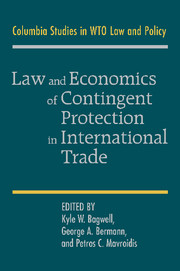Book contents
- Frontmatter
- Contents
- Contributors
- Introduction
- 1 An Overview of the Agreement on Subsidies and Countervailing Measures – Including a Discussion of the Agreement on Agriculture
- 2 Do the World Trade Organization Disciplines on Domestic Subsidies Make Sense? The Case for Legalizing Some Subsidies
- 3 Subsidies and Countervailing Measures: Determining the Benefit of Subsidies
- 4 The Enduring Problem of World Trade Organization Export Subsidies Rules
- 5 The Boeing–Airbus Dispute: A Case for the Application of the European Community State Aid Rules?
- 6 Antidumping: Overview of the Agreement
- 7 Price Differentiation in Antitrust and Trade Instruments
- 8 Nonpreferential Origin Rules in Antidumping Law and Practice
- 9 The Appellate Body Interpretation of “Sunset Reviews” Provisions of Anti-Dumping and Countervailing Measures Agreements: A Critical Analysis
- 10 The Safeguards Agreement – An Overview
- 11 Why Are Safeguards Needed in a Trade Agreement?
- Index
- References
4 - The Enduring Problem of World Trade Organization Export Subsidies Rules
Published online by Cambridge University Press: 03 May 2010
- Frontmatter
- Contents
- Contributors
- Introduction
- 1 An Overview of the Agreement on Subsidies and Countervailing Measures – Including a Discussion of the Agreement on Agriculture
- 2 Do the World Trade Organization Disciplines on Domestic Subsidies Make Sense? The Case for Legalizing Some Subsidies
- 3 Subsidies and Countervailing Measures: Determining the Benefit of Subsidies
- 4 The Enduring Problem of World Trade Organization Export Subsidies Rules
- 5 The Boeing–Airbus Dispute: A Case for the Application of the European Community State Aid Rules?
- 6 Antidumping: Overview of the Agreement
- 7 Price Differentiation in Antitrust and Trade Instruments
- 8 Nonpreferential Origin Rules in Antidumping Law and Practice
- 9 The Appellate Body Interpretation of “Sunset Reviews” Provisions of Anti-Dumping and Countervailing Measures Agreements: A Critical Analysis
- 10 The Safeguards Agreement – An Overview
- 11 Why Are Safeguards Needed in a Trade Agreement?
- Index
- References
Summary
This chapter examines the World Trade Organization (WTO) rules and decisions concerning export subsidies in the nonagricultural context to determine why these disputes are so prevalent and contentious and whether the rules or their interpretation should be altered. It discusses the basic economic case against export subsidies and political economy explanations for their continued use. It then reviews two central concerns about the WTO rules on export subsidies. First, it examines issues surrounding identification of export subsidies, including defining what constitutes a subsidy, distinguishing export subsidies from other types of subsidies, and how closely the WTO should review domestic policies for potential (rather than actual) export subsidies. Second, it discusses the difficulty the WTO has had in finding an appropriate remedy for violations of the prohibition against export subsidies. It argues that existing WTO rules do not adequately address either set of issues. In particular, Panels and the Appellate Body should adopt a more appropriate level of penalty for the use of export subsidies, such as tying the level of penalty to the adverse trade effects from the subsidy.
Introduction
Export subsidies have been at the center of a long series of high-profile disputes at the WTO. For example, in the 1990s, Canada and Brazil initiated reciprocal complaints that each gave subsidies for the export of domestically made regional aircraft. A number of countries challenged the United States over its rules for “foreign sales corporations.”
- Type
- Chapter
- Information
- Publisher: Cambridge University PressPrint publication year: 2009

